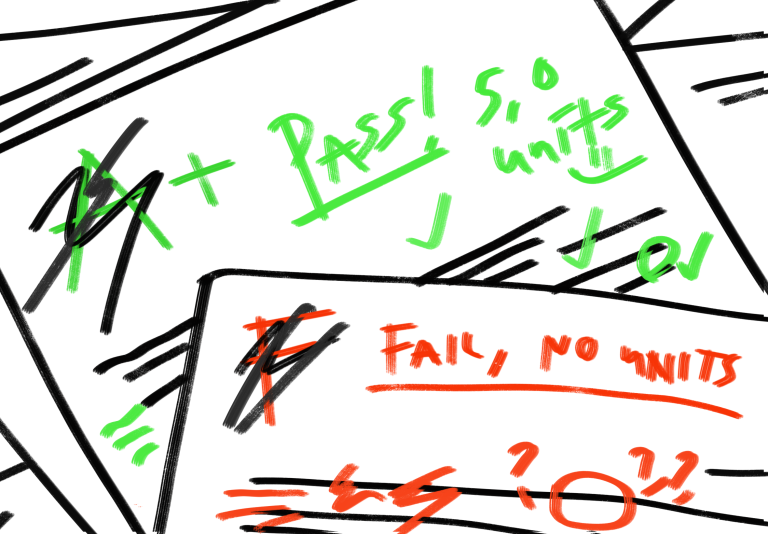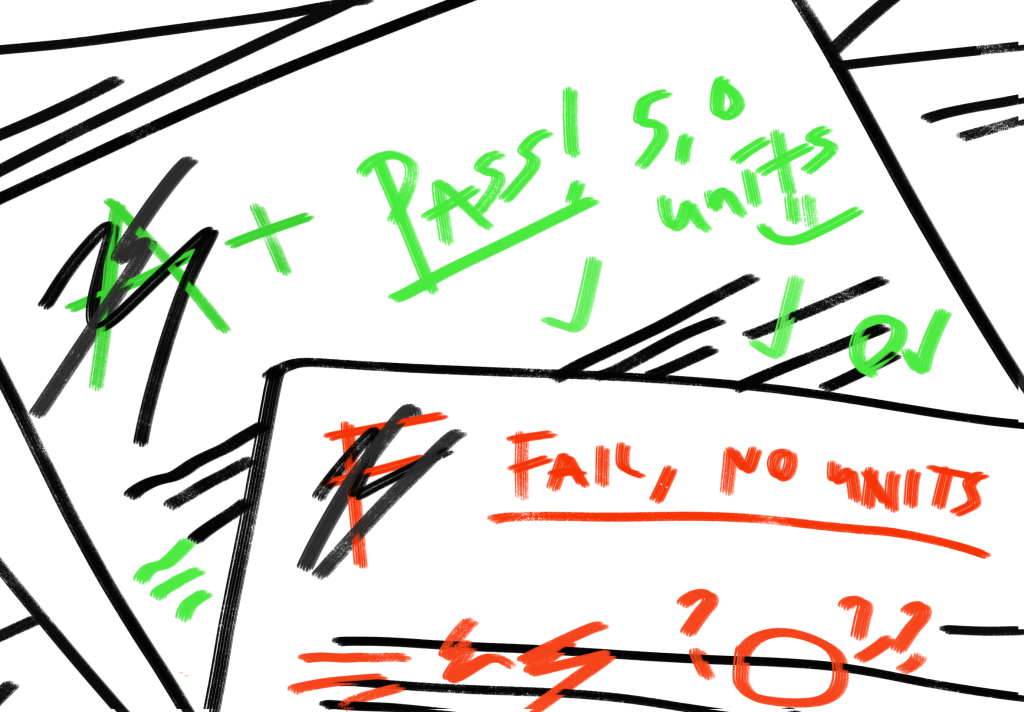
Andy Knox
Arts & Entertainment Editor
Nobody likes grades — they suck. They stress students out, prevent them from taking harder classes, and motivate them to cheat. Most of my peers who I’ve asked have admitted to cheating at one point or another; an unethical act that would usually be unnecessary without the incentive of raising one’s GPA.
The growing awareness of these issues and the revolutionary attitudes prevailing in Millennial and Gen-Z culture have inspired a growing movement to remove the letter “A-B-C-D-F” system entirely. One popular proposal is to replace grades with a pass/no-pass system for first-year students to smooth the often jagged transition to higher education. Some suggest doing away with the system for students of all years, or similar offshoots of the Evergreen College approach, in which student reports include “narrative evaluations” instead of grades.

A recent NPR article mainly focused on the theoretical benefits of these new changes, with a section dedicated to a few counterarguments. Most arguments in favor of the change were purely speculative, the only point backed up by data being that gradeless systems correlate to lower student stress levels. On the other hand, the latter section cited more convincing sources.
First, the article cited a 2022 study that found students at Wellesley College to be more likely to take harder classes with the changed grading system but also put less effort into the courses as evidenced by professors’ reports of lower attendance, less preparation for class discussions, worse grades, and several other facts. Further mentioned by NPR’s article, Johns Hopkins University’s recent decision to reverse a similar policy for first-years cites faculty testimony that the system would “merely delay development of study skills and adaptation to college-level work.”
To expect that most students would use a system like this as a safety net while they adjust to the difficulty of college courses sounds reasonable until you consider the alternative: students viewing mandatory pass/fail courses as a way to put far less effort into their classes while getting the same result. Would these policies be beneficial for some students? Absolutely. But are most students intrinsically motivated or forward-thinking enough to put their best effort into classes that they can pass easily? Let’s not kid ourselves.
Perhaps the biggest problem with grades is the factor of cheating, but that doesn’t go away with pass/fail or self-evaluation-based systems. For one thing, it’s unclear whether someone cheating and getting an A is gaining more than someone having passed a P/nP class while learning less than the cheater. Plus, it would probably be easier to lie or spin one’s way through an end-of-term evaluation than to cheat.
Proponents of un-grading love to frame the issue as a dichotomy between ‘grades’ and ‘learning,’ without questioning whether the two might be positively correlated. This paradigm ignores the fact that, at least in humanities classes, the surefire way to get an A is by doing the readings, attending every class, putting effort in quality work, periodically reviewing your notes, and seeing the professor when you don’t understand the material. Shockingly, that’s also how to maximize your learning outcomes.
While American universities still seem not to have found a better alternative to the current grading system, the responsibility is on professors to do their best to ensure that grades correlate with learning and comprehension of the material, while also making sure students have the resources to succeed. Students who feel their grades correlate with their effort, and the resources provided to them will be more likely to respect their classes.
On the other side of the issue, employers and post-graduate admissions offices ought to use a holistic approach, accounting for other aspects of an individual’s story and life and asking the appropriate questions.
Beyond grades, were you a leader? Have you done research? Did you have to work through college or were there additional challenges you faced outside of school? Did your background prepare you for college, or did you have to scramble to catch up early on? Fortunately, institutions are already moving in a more holistic direction.
In addition, the NPR article includes fascinating ideas beyond un-grading, like having students choose between written or verbal exams. Presentations can be a great alternative to tests, too. Proponents of un-grading are correct that searching for alternatives to a flawed system is important. At the same time, being as critical of alternatives as we are of the current one is an important step to make sure we won’t get fooled again.










